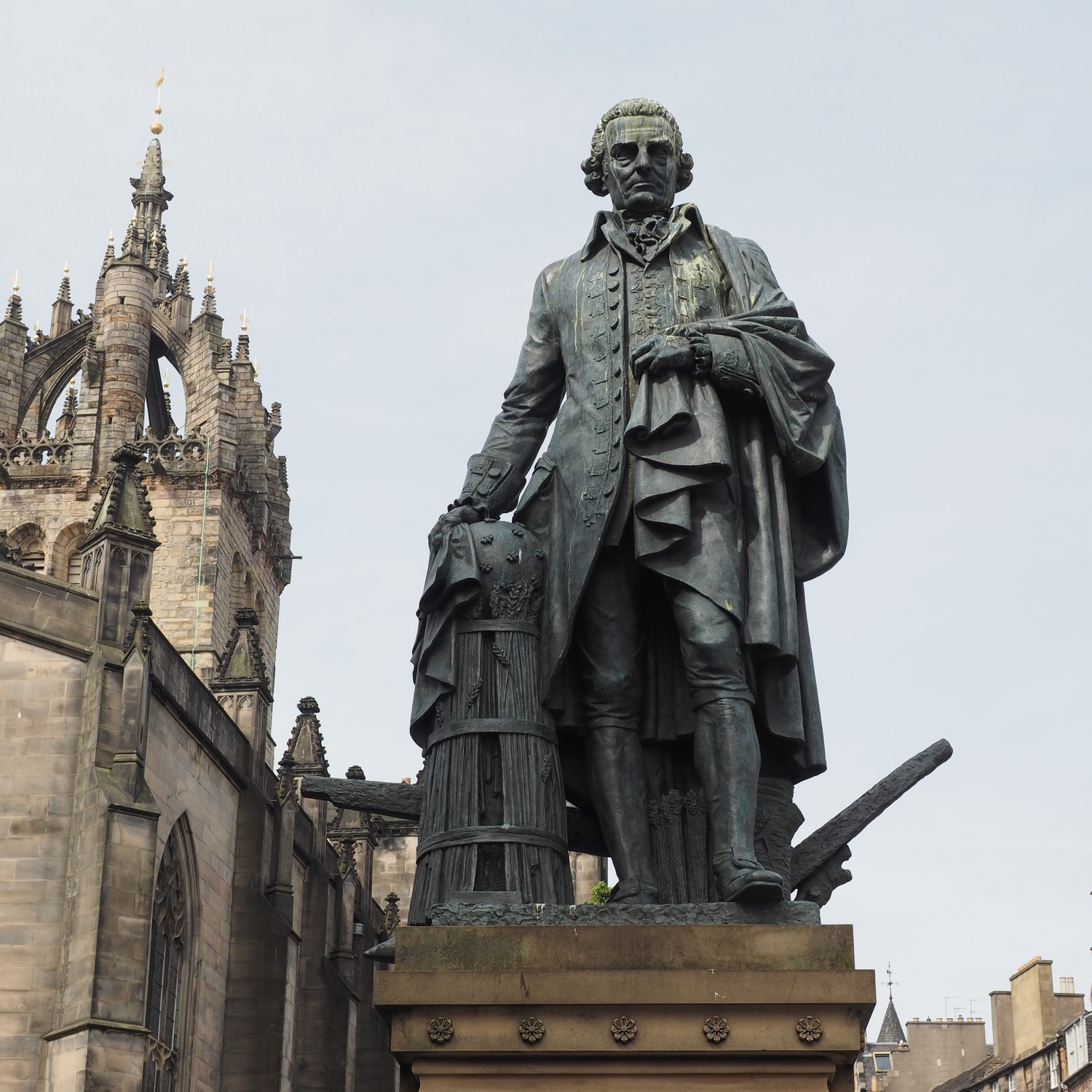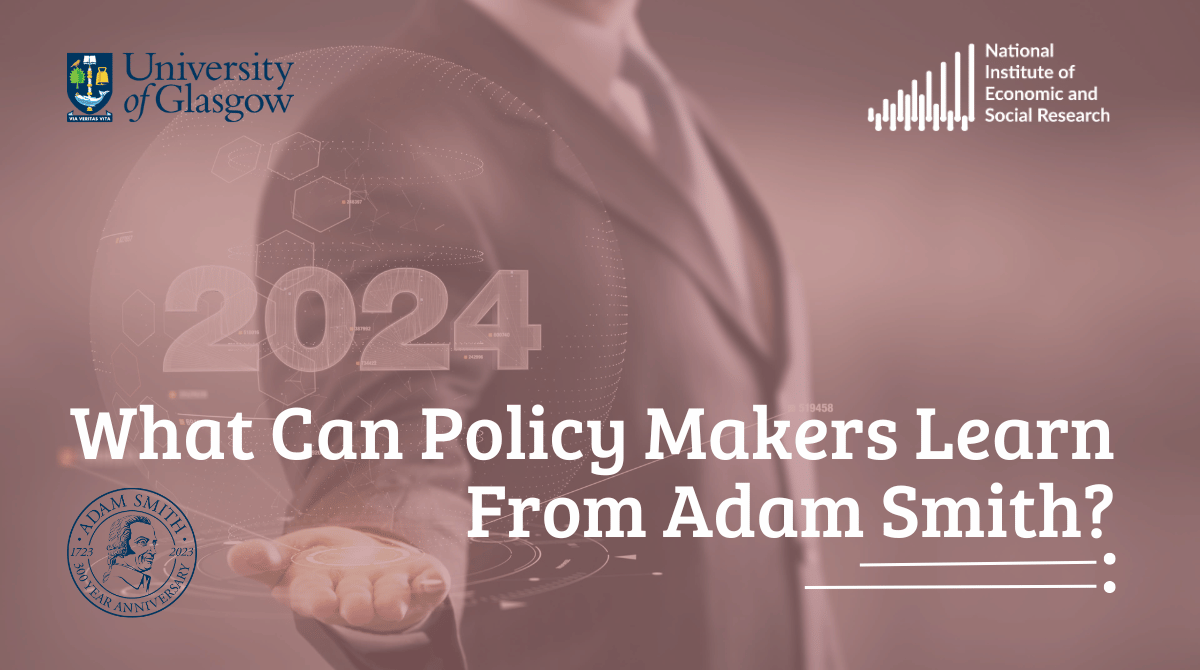What Can Policy Makers Learn From Adam Smith?

2023 marked the tercentenary of the birth of Adam Smith. Born in Kirkcaldy in 1723, Smith would become a towering figure of the Scottish Enlightenment. His writings, much of which draw upon lectures he gave at the University of Glasgow, helped to establish the modern discipline of Political Economy.
Many of his ideas remain the foundation of economic theories still in use today, with his work influencing many subsequent pioneering economists and political theorists from Karl Marx to Milton Friedman. Most importantly, his methods teach us how to think about the economy through a careful, logical, and rigorous examination of the world around us.
To mark the occasion, a Special Issue of the National Institute Economic Review has been published at the beginning of the year. The journal features 10 articles covering the full breadth of Smith’s contribution from trade through to banking, inequalities, and productivity. Contributions include articles from Diane Coyle (Cambridge), Marcus Miller (Warwick), Alan Winters (Sussex), David Williams (Queen Mary), John Aldrich (Duke), Michael Bordo (Rutgers), Hugh Rockoff (Rutgers), Alfred Duncan (Kent), Charles Nolan (Glasgow), Ronald MacDonald (Glasgow), Graeme Roy (Glasgow), Zachary Greene (Strathclyde), Jan Jasinski (Glasgow), Thomas Schober (Strathclyde), Thomas Scotto (Glasgow) and Sayantan Ghosal (Glasgow).
Two core themes bind the Special Issue together:
- First, it is remarkable how many of the issues that Smith was writing about remain relevant in 2024. Of course, the historical context is different. The industrial revolution was in its early stages when Smith arrived as a student in Glasgow in 1737. But the fundamental questions economists ask today have not changed. What drives economic growth? How might economic institutions and policies be designed to maximise living standards? How should the gains from economic activity be shared? What role can the banking system play in supporting growth in the real economy and how should it be regulated? How might self-interest (good and bad) motivate economic efficiencies? and, What are the gains (and losses) from international trade?
Most famously, Smith criticised the Mercantilist’s false ideas of wealth and their theories of how wealth is generated. For Smith, wealth did not consist of gold, or the power of a select few individuals or institutions, but in the living standards of the whole population. Smith wrote: “Every man is rich or poor according to the degree in which he can afford to enjoy the necessaries, conveniences, and amusements of human life” WN I:V. Today we are still debating how to improve prosperity – or wellbeing – not just for the few, but the whole population.
Smith argued that to understand where rising living standards come from, we need to understand how increased productivity can make more goods available to more people. For Smith, specialisation, trade and capital accumulation were crucial. But for society to flourish, it also needed good institutions, rules, and government policy. As we face complex intergenerational and global challenges, be it the climate emergency, rising inequality, or the age of Artificial Intelligence, there is much we can apply from Smith’s writings to the design of modern cohesive, fair, and resilient policymaking.
- Second, whilst it has become common practice to look to Smith for exact answers to today’s specific challenges, a common thread is that the most important lesson that we can take from Smith is his methodology. Unlike many modern economists, he did not start with a stylised model and then apply it to the real world in the hope that it would ‘fit’. Instead, he examined in detail the world around him and sought to explain what he observed through careful generalisation and focussed insight. He was an astute student of history, with his ideas also taking inspiration from the sciences, the arts and humanities. He was committed to evidence-based thinking and, crucially, was not afraid to change and update his thinking as his knowledge grew. And of course, first and foremost, he was a moral philosopher. For Smith, understanding how an economy operated – and should operate – requires an understanding of the values we possess as moral human beings. We care what others think of us and about what happens to other people. There is much that today’s students of economics and policymakers can learn from this moral approach to economics.
To mark the launch of the Special Issue, several of the authors alongside colleagues from the University of Glasgow – Professor Sir Anton Muscatelli, Professor Kat Riach and Dr Maha Rafi-Atal – participated in two panel discussions, with enthusiastic audience participation, to reflect upon these issues and Smith’s ongoing relevance for today.
Most economists will claim to ‘know’ Smith. But a full appreciation of the breadth and depth of his thinking is often lacking. The articles in this issue help fill that gap.
Sayantan Ghosal is a Fellow of the Academy of Social Sciences and the Adam Smith Chair in Political Economy at the Adam Smith Business School. Graeme Roy is a Professor of Economics at University of Glasgow Adam Smith Business School and Dean of External Engagement in the College of Social Sciences.



















